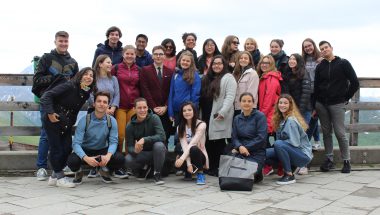Stories that Move
The online toolbox about diversity and discrimination
 English
EN
English
EN
 EnglishEN
EnglishEN DeutschDE
DeutschDE NederlandsNL
NederlandsNL MagyarHU
MagyarHU PolskiPL
PolskiPL SlovenčinaSK
SlovenčinaSK УкраїнськаUK
УкраїнськаUK EspañolES
EspañolES CatalàCA
CatalàCAAfter a year working at the Anne Frank House as a volunteer I was thrilled to be asked to prepare a workshop on “The power of propaganda” for the Education First Global Leadership Summit 2019 in Davos, Switzerland. The workshop took place offline, but was inspired by the Stories that Move learning path ‘Mastering the Media’.
The conference, over the weekend of July 12-14, involved teachers and 1,800 + students from across North America and Europe coming together to hear from world-renowned speakers talking about The Power of Communication. There were workshops led by experts, helping students develop creativity and collaboration by working in small international teams to propose solutions to global communication challenges.

The Anne Frank Youth team in Davos, July 2019
A group of us from the Anne Frank Youth Network had been invited – and we were to be one of those expert workshops! Only, ours was different from the others being presented, as ours was the only peer-led one; we had 80+ students per workshop and we trainers were only a few years older than the participants.
We arrived in the mountains with suitcases bulging with materials, from historical to contemporary examples of propaganda, posters etc. – everything we needed to lead a proper workshop.
Although one of my main tasks during my year as a volunteer at the Anne Frank House was working with groups of students, the experience at the GLS was rather different from what I had known before. We split all 80+ participants into groups of 10-15, so it felt much more intimate and more like a long discussion than a real workshop. The students were all engaged and knew much more about the topic of propaganda than I had expected them to.
A heated discussion broke out within one of my groups when – as an answer to the question if propaganda was always bad – a girl brought up the topic of putting horrific pictures on cigarette packets to scare off potential smokers. It was students against students, but they didn’t manage to find a clear answer.
It was probably my favourite moment of the whole weekend. It showed me that I had achieved my goal – to help them be critical and to question sources they see every day.
There’s nothing new about propaganda. It has been with us for centuries. But with recent technological developments, such as social media, I feel like it is more important than ever nowadays to inform young people about the dangers and how to recognise it – whether they stumble across it on an advertisement in a street or as a statement on their Facebook feed.
back to top